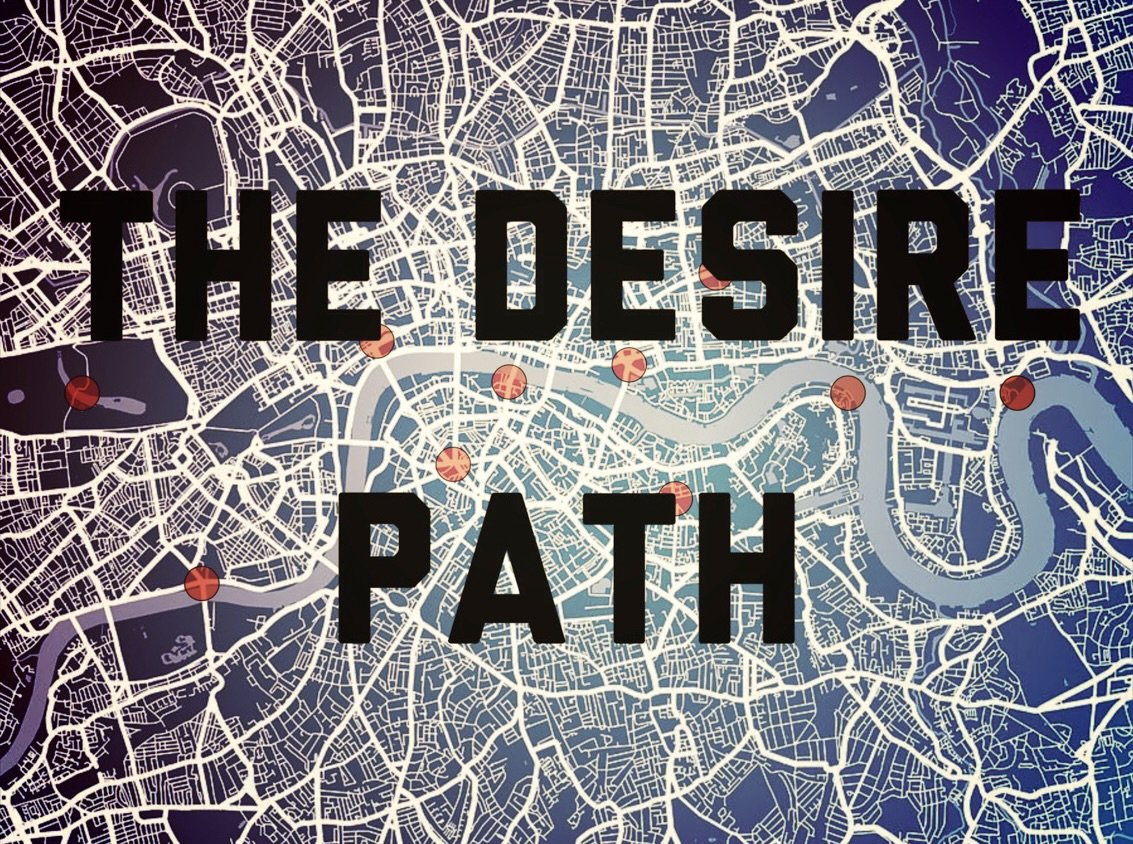The Desire Path, an interactive walk along London’s Southbank.
An in depth interview into the making of the Desire Path
A geo-location based theatrical opera that allows you to see the city of London from alternative perspective.
Composer Martin Ward and playwright Phil Porter have orchestrated an interactive walk around London using Prospero. This theatrical experiment is at the cusp of Theatre and digital technology in the modern age, where the world becomes your billion pound set and you are the actor that get’s to live the role. All that is needed are your smartphone and some headphones.
The Desire path has been created on Prospero using the GPS feature that allows you too self-author your own immersive walks wherever you please to.
This technology has huge potential and is still yet to be fully explored in the mainstream arts world.
Today we will be exploring and uncovering in great detail what the desire path is and what it could be going forwards.
Listen to whatever grabs your attention!
I started writing music when I was a teenager and I worked out that I didn’t really want to be an instrumental soloist. It wasn’t my thing, I got too nervous. I love playing in orchestras and things like that but I didn’t like the lime light. I went on to Guildhall School of Music and did composition there and then I spent around 10 years working in the Royal Opera house and for the BBC.
The Design Path is an interactive dramatic musical work , it’s kind of like a piece of theatre, but you experience it through your phone, and that’s connected to the Prospero website via 4G. The Desire Path converses with you while you are wearing headphones. It’s a mixture of text, music, directions and reminders on your phone of where you’re going. All of this is monitored without you realising via GPS and you move through GPS trigger points and that moves the story forward.
About five years ago I decided I was going to do an MA in experimental music. I can remember when I started that I already had this idea in my head that you could write a social media opera. I had no idea about how to approach it, so I did the MA at Brunel University and that was where I wrote a podcast opera. All of this - I didn’t realise at the time - was kind of leading to the Desire Path in quite logical steps. It comes from a fascination with personal technology, smart phones, social media,and that led me to look at the smartphone as being the stage in which we could stage a piece of theatre.
I’ve been into Psychogeography for awhile and it definitely came up out of the MA and that works with the idea of the world around us with potentially everything being site-specific and so it’s this idea that I could use GPS inside a persons phone so that we could track their journey and nit the content of the story into the world that is around them.
Psychogeography, as the term suggests, is the intersection of psychology and geography. It focuses on our psychological experiences of the city, and reveals or illuminates forgotten, discarded, or marginalised aspects of the urban environment.
The definition of a Desire Path is a path that is passed created by the consequence of erosion caused by human or animal footfall traffic. The path usually represents the most shortest or most easily navigated route between an origin and a destination
I remember trying to map out how we could do a multi linear structure, so putting branching choices in where you might have three options in front of you, so that you can choose which path you want to go on. The GPS will track that and take the story in different directions, and then it might branch again or you might be led back to the original pass so that you might end up at the same destination but there is various different options on how to get there.
Another thing that should be mentioned is geocaching, there’s definitely not a direct link as I didn’t plan it that way but the more I have told people about it the more people have said ‘ do you do geocaching by any chance?’
All that city life around you is kind of becoming a part of what you’re listening to so you are listening to what you hearing through the headphones but also you’re listening to the natural world around you, it’s not like a pristine silent sound that you might get inside a theatre or in cinema, Outside you can’t control that.
I started developing the story with the playwright Phil Porter who I have worked with a lot, and we’re good friends so we know each other really well. A lot of writing the desire Path as it currently exists was us kind of getting our heads around what is possible here. There was so many options to choose from but we also we had nothing to refer to, to show us what had worked in the past.
We knew that this was a development project so in a way we didn’t have to work out the whole story, we wanted to work out something that we knew that would be immediately intriguing to a listener and that was going to be around 40 minutes long. So that we could set up future possibilities and not close to many doors but leave our options open for the future and this is like the nature of creating development work is unless you’re already adapting an existing story, The project was largely about exploring the potential of the technology.
It ended up being a really good decision and it went really well and the fact that Prospero already existed meant that I just entered into the already existing software, if i was to go on the app development and design route I would’ve been starting at square one. Prospero made the piece that only existed in my head accessible in the real world.
In stage theatre or traditional theatre it’s always important for the timing to be exactly right, doing sound design in a theatre you would be ‘like that’s two seconds if a transition wasn’t right’ I think I got too hung up on making the desire Path like that, I should’ve realised for this kind of thing you’ve got to be a lot freer. Because people walk at different speeds, you have to expect and design it in a way where you know that the audience are going to have lulls in the drama which you wouldn’t have in the theatre.
Digital work is something that is conceived from the very outset as working in a different way, It’s about creating a piece that could not exist on the stage, that can only exist in this world. Technology might have moved on in five years time and it doesn’t work anymore. It might have a shelf life but we don’t know because we don’t know where we’re going to be in five years, And it’s about kind of embracing that in a way.
The question with this is that it’s not a piece of theatre as a theatre going audience knows it, and then they don’t know it exists so they’re not looking for it. So how do they find it? It’s also not what your augmented reality gamers/Pokémon GO crowd are looking for either because it’s not completely a game either. One of the biggest challenges for this kind of work is that you’re creating something for for which there is not already an audience. So you can’t follow the traditional theatre route of knowing who the theatre audience and knowing how to get in contact with them, i.e through post or weekly letters. The podcast opera proved that that didn’t really work with this digital piece.
It doesn’t matter what you make – lessons, workshops, stories, drama, training, video games – Prospero gives you the power to share your work, your ideas and your teaching with the world.
To find out more about Prospero and how you can start creating today on Prospero, check out our home page or alternatively give us a follow on social media and stay up to date with all the latest information and opportunities for artists, educators to explore, using this new alternative interactive platform.


